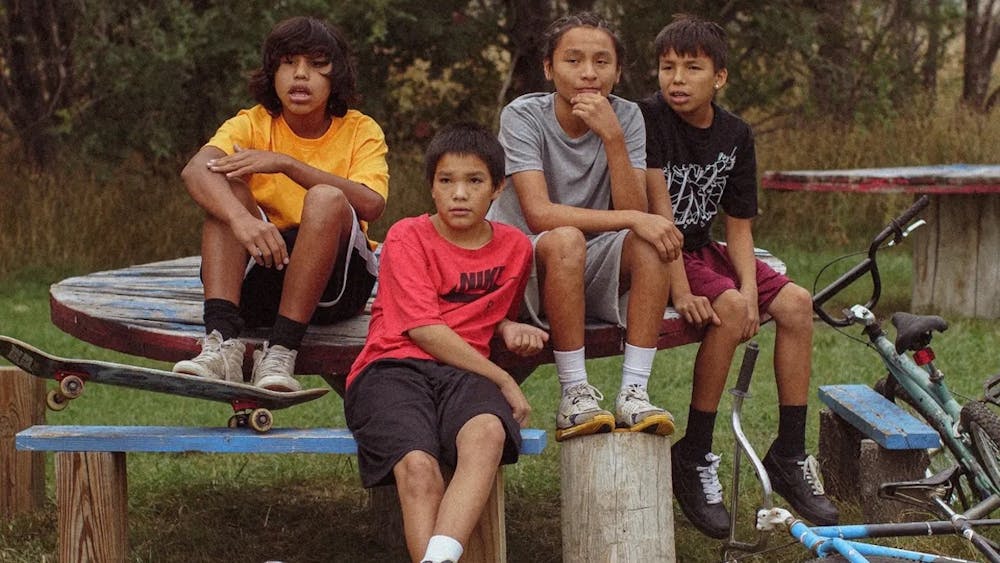In the Paramount Theater Saturday, tucked away from the hustle and bustle of the downtown mall, sat a room full of film enthusiasts all gathered for a screening of “War Pony” and a discussion with writer-directors Gina Gammell and Emmy-nominated actress Riley Keough. The two talked about the making of their joint directorial debut and the importance of showcasing Native American stories.
As part of the Virginia Film Festival’s “Indigenous Cinema of the Americas” series, the film follows 12-year-old Matho and 23-year-old Bill, played by LaDainian Crazy Thunder and Jojo Bapteise Whiting, as they navigate life on the Pine Ridge Reservation.
Based on the real-life experiences of Bill Reddy and Franklin Sioux Bob — the pair that complete the movie’s team of writers — the film explores coming of age on the reservation, and the struggle to overcome poverty and exploitation in marginalized communities.
For Gammell and Keough, the stories of Reddy and Sioux Bob, along with the many other local Pine Ridge friend-turned-collaborators whom they worked with on the film, needed to be represented with honesty and respect.
“[Bill and Frank] wrote the film with us, so every word that was in the script was approved by,
then written by them,” Keough said, adding that the four of them would come up with ideas and write them out all together. “For us, it was really just about helping them tell their life story.”
This same courtesy was extended to the actors as well, who Keough explained had a lot of agency within their roles, getting a say in how their characters would speak, react within scenes and fit into the overall narrative.
Keough attested that the authenticity and the natural flow of the film’s dialogue has everything to do with the boys speaking up if “something didn’t feel natural.” Keough and Gammell would take what the actors told them in rehearsal to Reddy and Sioux Bob to be written into the script.
“We allowed all the actors and other collaborators to make adjustments and change things they wanted to change about their characters,” Keough said. “It was very much very collaborative.”
This culture of collaboration was essential to the film being made, for Gammell and Keough had no intention of making one when they first became friends with the cast and crew eight years before the film’s release in 2022.
Keough said it was these friendships and the stories shared within them that turned an idea, often joked about, into a full-blown production, giving the project a team of people behind it who knew the importance of bringing indigenous stories to the forefront and representing indigenous communities “mindfully and consciously.”
While the scenic cinematography of the South Dakota plains and the transportative soundtrack and score engross viewers into the film’s world, it is the genuine and riveting performances from the film’s leads — who had never been on screen before — that tug at the heartstrings.
“It was years of casting,” Gammell said, sharing that casting the role of Bill specifically was hard because they had to find an actor that could accurately portray a young Bill Reddy.
The team found their Bill in Bapteise Whiting, who Keough said was able to capture Reddy’s “mischievous” essence.
Bapteise Whiting’s interpretation of the character is masterfully sentimental and pleasantly comedic, showcasing both the tribulations and triumphs of Bill’s efforts to better life for himself and his family. The film follows Bill and his entrepreneurial efforts, displaying through him the obstacles that are stacked against those living on the reservation. From endearing and humorous escapades with a poodle to distressing upsets, Bapteise Whiting’s performance is captivatingly multidimensional.
While Bill and Matho’s paths don’t cross for the majority of the film, the two serve as parallels for one another. Based on Reddy and Sioux Bob’s stories from childhood and early adulthood, the boys’ separate storylines represent two different stages of life in the same place.
Crazy Thunder’s portrayal of the young and vulnerable Matho is excellent and displays the inherent susceptibility of adolescence. A boy feigning for belonging and protection, Matho’s desire for the approval of his father and the other Oglala Lakota boys on the reservation leads him into many dangerous and consequential situations. Crazy Thunder’s ability to bounce between joyful, boyish disregard and crushing grief is not only immensely compelling, but also coincides with one of the film's main themes.
“They were the characters,” Gammell said, explaining that casting these two in the lead roles was a no-brainer. “They just stood out.”
Similarly to Bill and Matho’s dispositions, the film’s tone jumps around too, moving from comedy to sadness and then back again in an unpredictable fashion. Keough said that having humor and sorrow work in tandem was both intentional and essential to the story, serving to reflect the same emotional duality of life.
“There's a lot of tragedy and heartbreaking moments in the film, but I think that, you know, we all were aligned in our sensibility, or in our desire to create a film that was kind of everything, like life,” Keough said. “It's funny, it's tragic, it’s all these things.”
Gammell added that while it makes it hard for people to put their film “into a box,” it was important for them to include all these different tones to tell an authentic and powerful story.
“[We were focused on] being honest with the stories and that the human experience is joy and pain, sometimes at the exact same time,” Gammell said.
“War Pony” is an insightful and moving film that represents a community rich with history and tradition in contemporary America. Equal parts poignant and amusing, this film is a labor of love that illustrates Oglala Lakota reservation life with thoughtfulness, telling a greater story about the complexities of the human condition.







